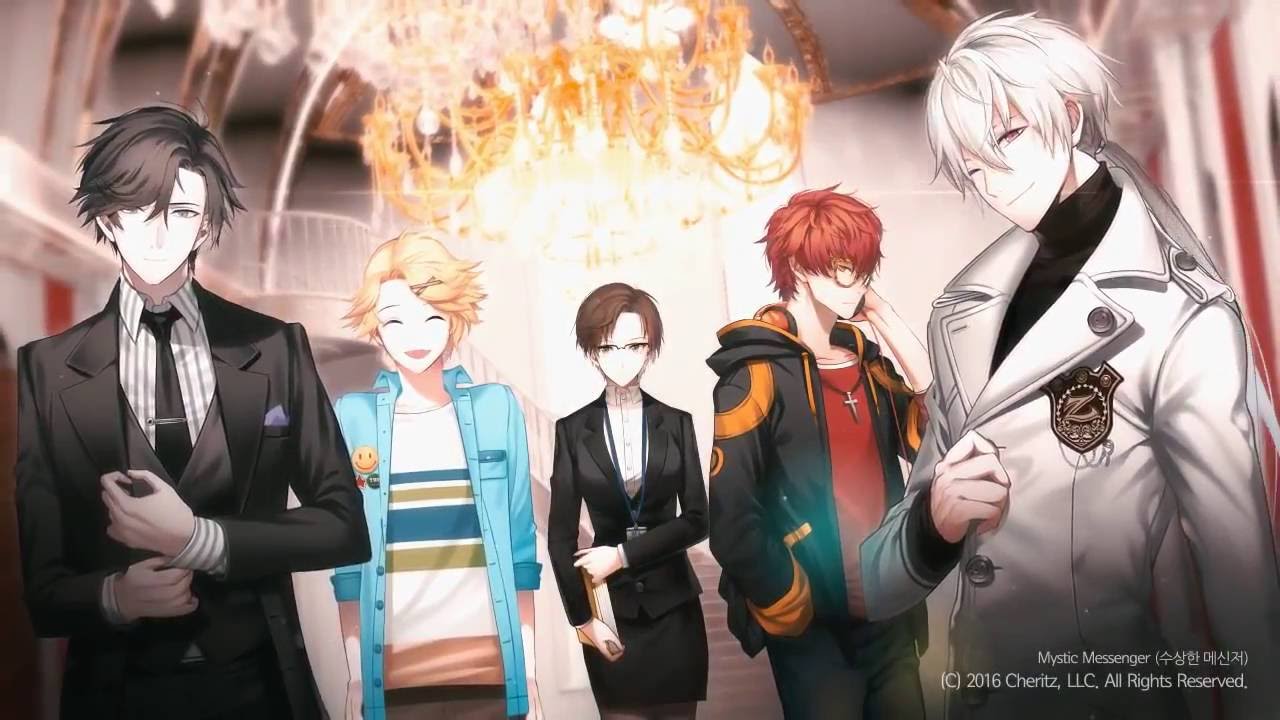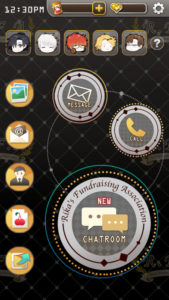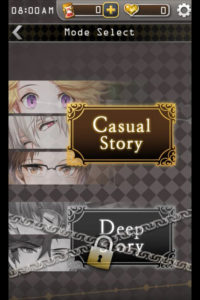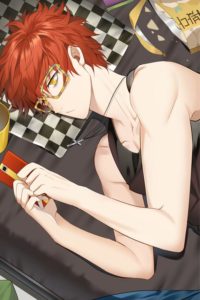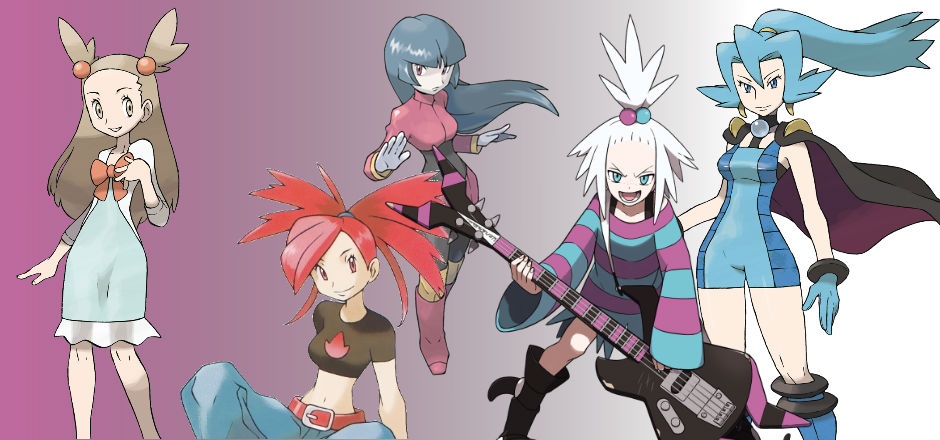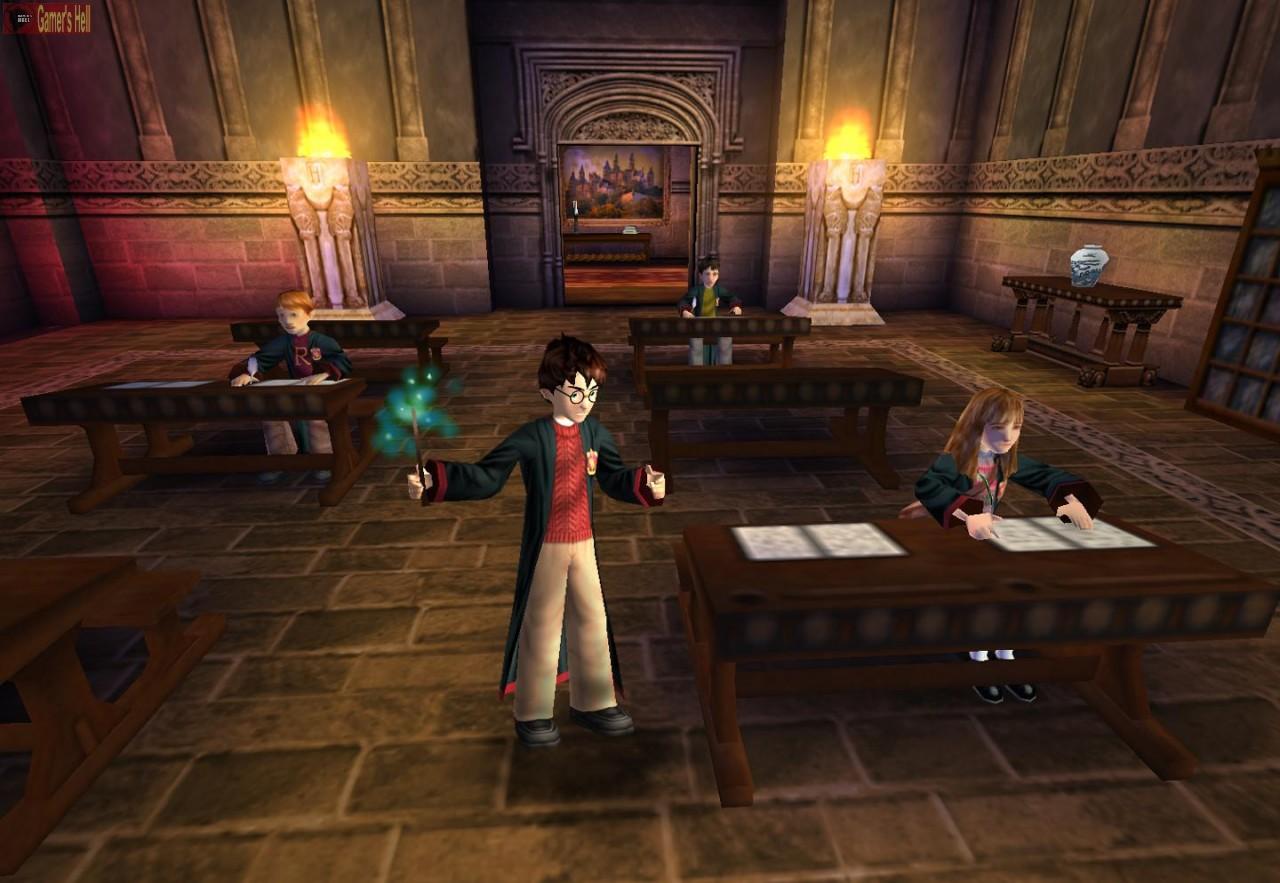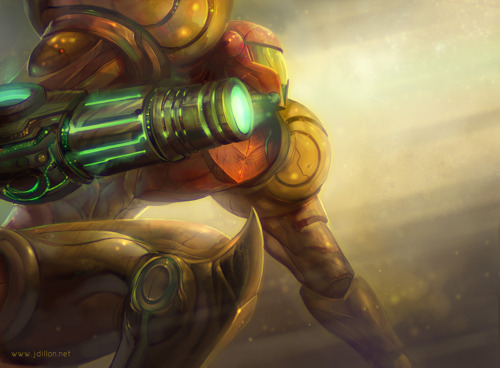If I were to describe Mystic Messenger, I would call it a dating app with anime boys. Sadly, you can’t meet them in real life, but their personas are as real as they come.
Mystic Messenger (shortened to MysMe) is an otome game—a romance visual novel targeted towards female players whose goals are to progress in the main story while developing a romantic relationship with one of several male characters. It launched on iOS and Android platforms first in South Korea and then worldwide during summer 2016 and has gained over 2.5 million downloads since then. One major detail to address, though—the game is Korean, not Japanese.
Created by Cheritz, a small South Korean company that produced two other otome games on Steam, MysMe mimics messenger apps like LINE or WhatsApp and demands a great deal of attention from the player as it runs on real-time gameplay. Participating in chatrooms, answering phone calls and emails, and responding to text messages are crucial if the player expects to achieve a good ending.
Despite the mental labor, MysMe has changed the way players immerse themselves in otome games and diversified the target audience to players of different genders and sexualities.
You play as a protagonist who, in CGs, is a young woman with long brown hair and bangs that shadow her eyes, which is an archetype of otome games (i.e. Voltage Inc.). Missing eyes allow players to identify with the protagonist because she has a generic identity.
The game gives you message response prompts, so depending on your answer, you may or may not be on the right path. Each character has one good ending, one normal ending, and three bad endings. Your responses matter a whole lot more than you’d expect, and once you get in the chatrooms to talk to your contenders, they’ll give you hearts in accordance to their colors should they find your responses suitable to their tastes.
Each route runs for 11 days, but you can speed up the process by spending hourglasses, which are the game’s currency. The hearts you receive from the characters can be exchanged for hourglasses (100 hearts = 1 hourglass). If you don’t have enough hourglasses, the game offers in-app purchases.
MysMe’s contenders include: Zen, a narcissistic actor; Yoosung, an addicted gamer in college; Jaehee, a hardworking assistant (who’s the only female); Jumin, a cat-obsessed corporate heir; and Seven/707, a hacker memelord.
Not only do these characters develop a romantic relationship with the protagonist, but they also develop genuine relationships with each other to push the narrative forward. Their interactions and backstories give them more depth than their 2D designs, and sometimes players will discover additional information about certain characters in different routes that they did not learn in their pursued character’s route.
There are two different route stories: Casual and Deep. The former encompasses Zen, Yoosung, and Jaehee while the latter, for 80 hourglasses, contains Jumin and Seven. As players go through each route, they discover more about the characters’ personalities that make them look beyond their archetypes.
The phone calls are probably my favorite aspect of the game because of the voice acting. It took me a while to get used to the Korean since most otome games come from Japan. They call after you complete chatrooms, and you can choose to answer or decline. As they talk to you over the phone, message response prompts will sometimes appear.
What’s so interesting about phone calls is that when you make an outgoing call to a specific character, you may get a response or you may be directed to their voicemail. The conversations vary in length—some may be quick while others last longer. Phone calls give supplemental information on the characters, and missing some calls doesn’t affect your ending. I would say late-night phone calls are the best (both incoming and outgoing).
Since MysMe is an otome game, there are visual novel aspects, which are mostly voice-acted. The messages in chatrooms have changing fonts, emote stickers (available for purchase on the LINE app), and altering background music and wallpapers depending on the person you are talking to and the time of day. When you type in your name as you start the game, the characters actually address you by your name, so it feels really personal.
What appeals to players about MysMe is its ability to offer humor, drama, and relatable hardships. The characters also show genuine concern for the protagonist’s health by asking if she has eaten yet, or reminding her to sleep early (despite having chats open at ungodly hours of the night).
Not many otome games go so far as to directly address the player in such a way, and MysMe has a sneaky habit of breaking the fourth wall. In fact, breaking the fourth wall seems to be one of the reasons why players enjoy the game so much: because of its ability to acknowledge reality.
Over the holidays, Cheritz released a Christmas DLC to reel players back into the game after having their fill of the main game. The DLC works as an alternative universe where the characters already know you, but you have yet to remain romantically involved with one of them. It lasts for two days: Christmas Eve and Day.
The good thing about this DLC is that it’s not a timed event, so it will stay as a permanent feature of the game. However, it costs a hefty 100 hourglasses to unlock. In this event, players longing for a romantic relationship with Jaehee (because in the main game, the protagonist can only pursue a platonic relationship with her) had their prayers answered when Chertiz included romantic interactions that suggest Jaehee is bisexual, or at least questioning her sexuality.
Seven is also bisexual, as discovered in the RFA VIP Package and in chatrooms. With a diverse range of players downloading and playing MysMe, Cheritz has given many opportunities for players to connect with characters, breaking the traditional all-male, heterosexual cast. Because of this, the relationship between developers and gamers has become just as personable and immersive as the game itself.
Cheritz stays active on Tumblr and has interacted with fans by listening to their suggestions, as well as seeing their memes—one of which has made it into the Christmas DLC. Since the game’s release there have been bugs, so to make up for these mistakes, Cheritz handed out free hourglasses to players—sometimes so many that players find themselves not needing to actually purchase hourglasses to unlock content.
Cheritz’s generosity doesn’t stop there. After the immense success of MysMe, the staff made an official announcement that they’ve donated some of their earnings to charities, saying that without fans’ time and investment in the game, they wouldn’t have been able to save lives. For a small development team, Cheritz certainly has tremendous compassion.
As Cheritz and its fanbase continue communicating with each other through social media, MysMe grows in love and support as well as high demand for more content. This developer-gamer relationship is integral to the gaming community in general, as feedback from fans only help to improve the game. When gamers see that their suggestions have been implemented into the game, they feel like they’ve become a part of the project to produce near-flawless results.
Mystic Messenger is definitely a unique model for otome games, and while it may not be for some people due to its rigorous need for the player’s attention, fans such as myself enjoy the emotional and romantic devotion.
Author note: The post was written before Cheritz included the Valentine’s Day special endings and April Fool’s DLC, which are now available.
